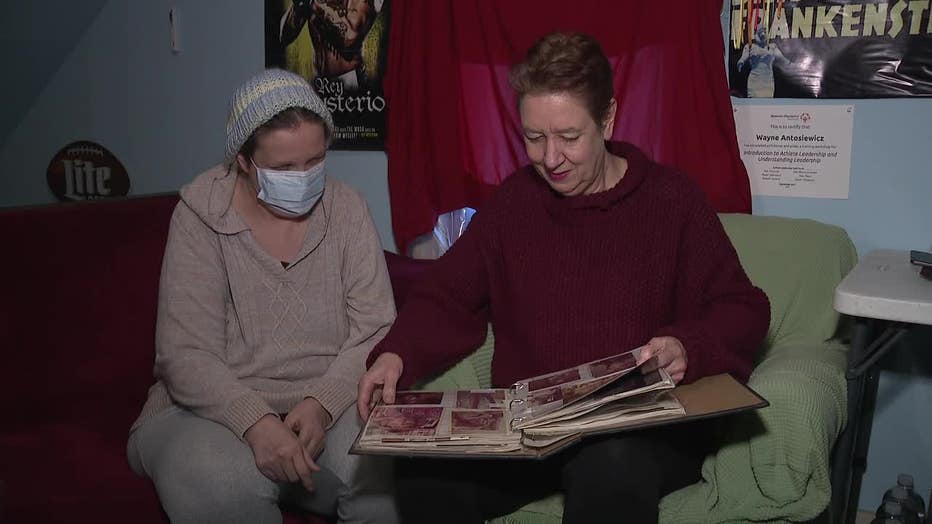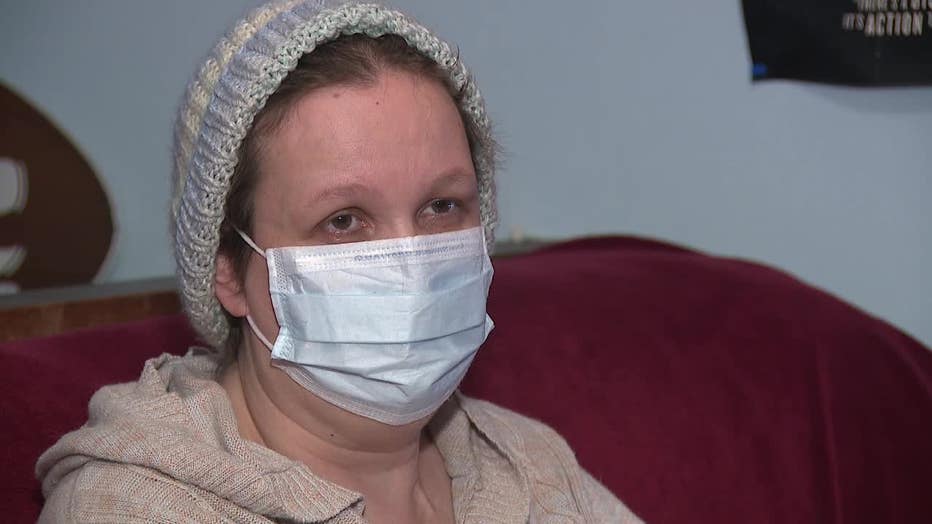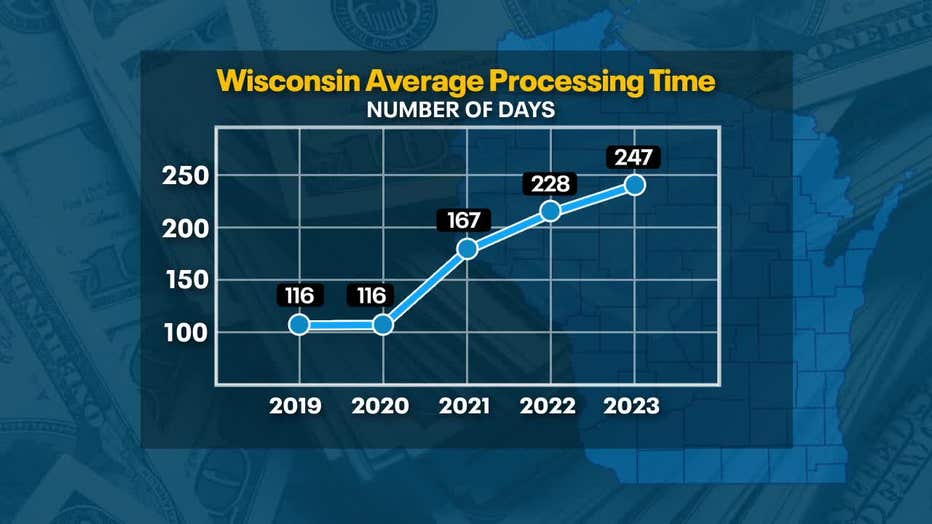Disability decision delays impact Wisconsin’s most vulnerable
Disability decision delays impact Wisconsin’s most vulnerable
They can’t work, have little money to fall back on, and are waiting months for the approval of claims. The delays are impacting some of Wisconsin’s most vulnerable.
MILWAUKEE - They can’t work, have little money to fall back on, and are waiting months for the approval of claims that could put a roof over their heads. The delays are impacting some of Wisconsin’s most vulnerable.
Christine Stock and Laurie Keophiphath are side-by-side in many of their childhood photos. Decades later, the sisters remain side-by-side in good times and bad.

Christine Stock and Laurie Keophiphath
In October, Stock was diagnosed with breast cancer following a mammogram. She initially worked through her chemotherapy treatments but says the exhaustion and pain became too severe.
"Two days before my mastectomy, I couldn’t work anymore," Stock told Contact 6.

Christine Stock
Stock’s cancer progressed to Stage 4. For months, she’s been living at her sister’s house but she wants to live independently. It’s the reason Stock says she applied for Supplemental Security Income (SSI) and Social Security Disability Insurance (SSDI) in late May.
SIGN UP TODAY: Get daily headlines, breaking news emails from FOX6 News
When she met with Contact 6 in January, Stock had called the Social Security Administration (SSA) repeatedly asking for a status update.

"They just said that they were backed up. That’s all they said," said Stock.
People can apply for SSI if they are disabled and in financial need. They can also apply for SSDI if they’ve worked long enough and paid social security taxes.
Back in 2019, it took 116 days on average to get an initial disability decision in Wisconsin. Today, it takes 247 days on average. Decisions are made by the Disability Determination Services (DDS) in Madison.

"It's an unacceptable thing to be going through in my opinion," said Keophiphath of the processing delays.
The Social Security Administration agrees. Doug Nguyen, regional communications director for SSA, tells Contact 6 they’re working to "reduce the backlog of disability cases that developed during the pandemic." However, he says they need "adequate and sustained funding."
FREE DOWNLOAD: Get breaking news alerts in the FOX6 News app for iOS or Android
Nguyen says SSA received 55% of the increase President Biden requested for its administrative budget in 2023. He says SSA has experienced historically high attrition at DDS locations and is having difficulty hiring new workers, "similar to the larger labor market."
Wisconsin Department of Health Services (DHS) also blames a transition mid-pandemic to a new federal system for processing disability claims. A DHS spokesperson says Wisconsin’s old system was more efficient.
"SSA has mandated that all state Disability Determination Services migrate to a new federal system… Wisconsin began its implementation late 2019… This meant that the majority of examiners began using the new system during the pandemic," said Elizabeth Goodsitt, DHS communications specialist.
Goodsitt says Wisconsin previously used a system "customized over several decades to maximize efficiency" and "Wisconsin’s legacy system was superior.."

Looking to attract and retain workers, Wisconsin also just gave 150 people a pay raise at DDS.
"The more pressing factor is there’s been a huge amount of attrition," said Alex Eichhorn, a partner at Tabak Law, LLC.
Eichhorn handles disability cases and says those who apply are among Wisconsin’s most vulnerable.
"They really have no assets to fall back on," said Eichhorn. "So this [delay] becomes a real problem."
About 24,000 people are currently waiting on initial disability decisions in the state. That includes clients of the free service Legal Action of Wisconsin.
"I’m seeing an increase in homelessness," said attorney Kelsey Brown at Legal Action of Wisconsin. "I have quite a few clients who are living out of their cars."
Brown says many rely on disability payments to pay rent, bills, put food on the table, buy clothes and visit the doctor.
When Contact 6 first met Stock, the wait was taking a toll.
"I feel like I’m a burden to them," Stock said of her family.
"She gets depressed. She gets upset. She gets angry and you can’t blame her," said Keophipath of her sister.
Six days after Contact 6 shared Stock’s information with the SSA’s Chicago region, she got word that DDS had approved her claims. Three days after that, her first payment arrived.
The approval puts an end to Stock’s wait, but she knows many others are still in line.
"There’s other people that don’t have the support system," said Stock.
Statement from Doug Nguyen, SSA Regional Communications Director
"Currently there are about 24,000 initial Disability claims pending in the State of Wisconsin, and the average processing time is approximately 247 days.
"For fiscal year (FY) 2023, we received 55 percent of the increase the President requested for our administrative budget. We are thankful for the funding increase we received from Congress and will use these resources to mitigate further service deterioration. One of our most urgent service issues is the significant number of people who are waiting too long for a disability decision. We are taking a comprehensive, multi-pronged approach to reduce the backlog of disability cases that developed during the pandemic. This strategy includes immediate action using specialized teams of current and recently retired SSA employees with disability experience to assist the state disability determination services (DDS) in processing cases, recruitment and retention initiatives to address processing capacity issues in the DDSs, and a review of the disability process to promote efficiency and consistency. We have already begun to implement these initiatives to improve service to the people who are counting on us, but it will require adequate and sustained funding to accomplish.
"We are analyzing factors that are contributing to the backlog to reduce it and prevent a recurrence. There are a combination of complex issues including difficulty hiring similar to the larger labor market, historically high attrition in the DDSs of about 20 percent for the last two years for disability examiners, which we are assessing for drivers, and shortages of medical experts to conduct consultative exams and review cases."
Statement from Lea Kitz, Executive Director of Disability Rights Wisconsin
"Processing times for social security disability determinations are increasing at an alarming rate. Virtually every day, DRW hears about people dying or experiencing life-threatening losses of housing, delayed health care, and bankruptcy while waiting for a disability decision. In the past, DRW advised people that it could take between 3 to 5 months to receive a decision. We now warn applicants that it can take upwards of a year or more. Because of the very real consequences of delayed determinations, immediate action to fund this critical service at a level sufficient to assure a timely response is required. Although the recent federal appropriations bill increased funding to the Social Security Administration (SSA), the dollars that have been added are not sufficient to address rising costs, reduce workloads, and eliminate the case backlog. Applications move through the decision-making process more quickly if they are complete and accurate. To avoid the additional time it can take for SSA to ask applicants clarifying questions, DRW encourages people to work with Disability Benefit Specialists at Aging and Disability Resource Centers (ADRCs) to ensure that their applications are as strong as possible."
DHS Statement, in part
"SSA has mandated that all state Disability Determination Services migrate to a federal system called Disability Claim Processing System (DCPS). States have different implementation dates. Wisconsin began its implementation late 2019, and immediately began creating training material for staff to transition to the new system. This meant that the majority of examiners began using the new system during the pandemic.
"Prior to the mandated migration to DCPS, Wisconsin used a legacy system that had been customized over several decades to maximize efficiency for our examiners and meet Wisconsin’s specific needs. There are very few customizable options available and DCPS excludes necessary functionality to efficiently process claims.
"Wisconsin’s legacy system was superior to the current DCPS system because it included more automatic prompts for examiners that made it easier for them to manage their very high caseloads. Caseload management tools have significantly lagged behind in DCPS as compared to the legacy system. In addition, the legacy system was superior for claimants. Under the prior system, Wisconsin Disability Determination Bureau (DDB) staff could customize turnaround time requests for additional claimant information based on average USPS mailing times, or the complexity of the ask. Now, the DCPS system hard codes 14-day turnaround time for claimants to respond to communications they receive in the mail, otherwise the claim could be denied. This has caused an increase in calls from very concerned claimants who are worried that they may not have adequate time to submit follow- up information. These calls are often handled by the very same staff whose time could be used processing additional applications for benefits.
"Examiners are highly trained professionals with specialized training to meet federal standards. Given the specialized expertise needed to process claims and complexity of these jobs, it is estimated that it takes 2 to 2.5 years for a new examiner to be fully trained and independent on the job. The skills and actions required to adjudicate cases have increased over the past years. SSA requires more documentation and evidence, and extensive vocational assessments on all adult claims. As a result of increased evidence, increased scrutiny, continuously growing case complexity, and a new nationwide case processing system rollout, case production has become more labor-intensive and slower. Adjudicators’ case counts have increased significantly, and the job has become untenable in many states. DHS been working to increase the pay for examiners since March of 2021, and were notified in December that SSA approved the funding for the pay increases, and we are now working on an implementation plan.
"Additionally, there are long lead times for SSA-required background checks. The Wisconsin DDB began utilizing the SSA-required updated the credentialing process in 2021. SSA processes HSPD-12 requests that are initiated by each DDS. The entire HSPD-12 credentialing (background check) process takes up to 6 weeks and cannot begin before the state makes a conditional offer to a candidate. The regular state process (from posting, interviewing and issuing a contingent job offer) takes approximately 5 weeks. Since beginning the HSPD-12 credentialing process, the time it takes now from posting a position to having a new employee walk through the door for training is approximately 11 to 12 weeks. This has resulted in several candidates who accepted our contingent offers but then withdrew their application after finding other employment opportunities while awaiting SSA to complete the credential process. Other recruits have not been able to start a training class at the offered date because they were unable to provide their current employer with adequate notice of leaving.
"Across the nation, state Disability Determination Services are experiencing unprecedented staffing shortages and production problems. Attrition rates have increased significantly throughout the country. Although the state’s quality remains high, Wisconsin is experiencing delays in processing times due the issues with the new system and staff shortages. When the pandemic hit and Wisconsin was transitioning to the new DCPS system, examiners had to endure a steep learning curve while working between two very different systems to process claims. This resulted in an increase in examiners retiring or seeking employment opportunities elsewhere. Wisconsin DDB currently has a larger percentage of examiners without many years of experience."

